5 Things To Check On The HVAC System When Buying A New Home

Purchasing a house is often a daunting effort. On the one hand, you’re thrilled to be searching for your very own home. However, on the other, you have to make sure that the property you’re buying is in good shape so that you aren’t taking on a lot of unnecessary hassle and stress. One aspect to consider is buying a house with an old HVAC.
5 Things to Look for in the HVAC System When You’re Buying a New Home
Contents
Following are five things to look for in the heating and air conditioning system when you’re buying a new home.
1. Inspect the HVAC System
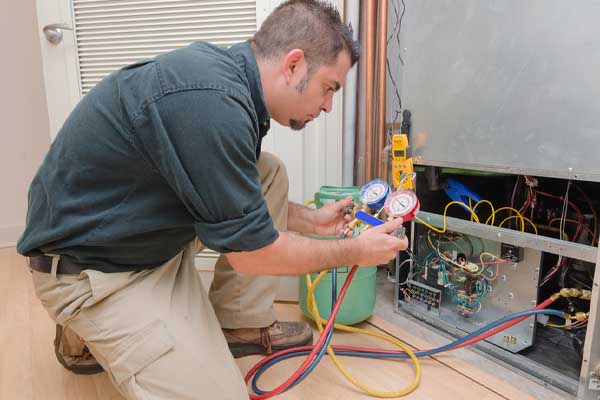
When performing a walk-through as part of the buying process, perform a thorough inspection of the HVAC equipment. You should look for evidence such as water stains, cracks, dents, rust, and more. Turn the furnace and the air conditioner on. Listen for strange noises such as hissing, banging, clanging, or whistling.
Find out what the age of the heater and air conditioner are. A lot of HVAC systems last for approximately 15 years before their lifespans run out, although some models can last for two full decades if they’re properly maintained. Ask whether the former owner has HVAC maintenance records that you can view for each unit. If the furnace or air conditioner is over 15 years old, consider how much you’ll have to pay to replace it and work this into your budget. At McAllister Energy, we can provide professional HVAC system inspections.
2. Check Out the HVAC Ductwork
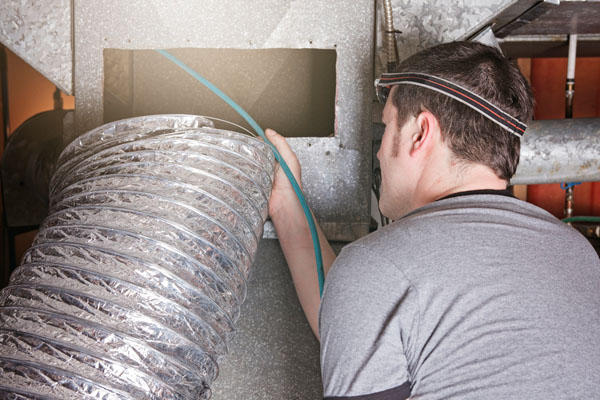
Much like heating and cooling equipment, ductwork has a finite lifespan. If you can, take the time to evaluate the condition of the ducts. If you’re able to access the crawlspaces or attic, check for gaps and other openings in the ducts. Inspect each HVAC vent to verify that the ducts are all firmly connected at these points.
You should additionally look inside of the ducts to verify that there isn’t any mold growing in here or any massive build-ups of dust. You can remove dust but it is a sign of serious neglect. Conversely, mold means that the ducts have high levels of moisture within them and this could be an indication of potential failure.
3. Ask About the Insulation
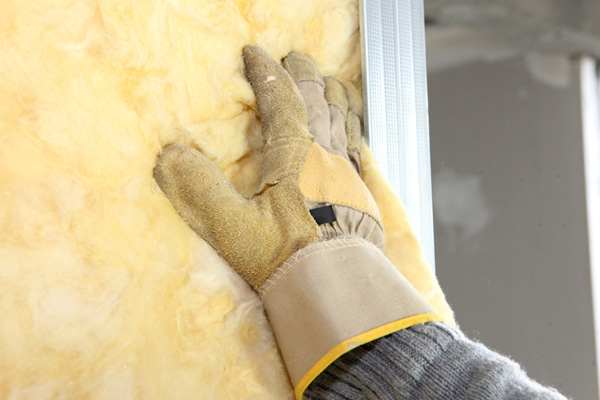
When buying a home, you want to know how much insulation it has and when this insulation was put in. If there isn’t a sufficient amount of insulation, the home won’t be efficient and you’ll always have high energy bills. If insulation was put in several years ago, it has probably settled quite a bit and additional insulation should be installed. In the even that this isn’t information that the real estate agent can provide, ask your agent to pass your question on to the seller.
As you move through the building, see whether or not it feels comfortable. Are their drafts coming through the windows and doors when you walk past them? Are some rooms colder or hotter than the rest? Is the air stale or does the building interior smell musty?
4. Take Stock of the Refrigerant
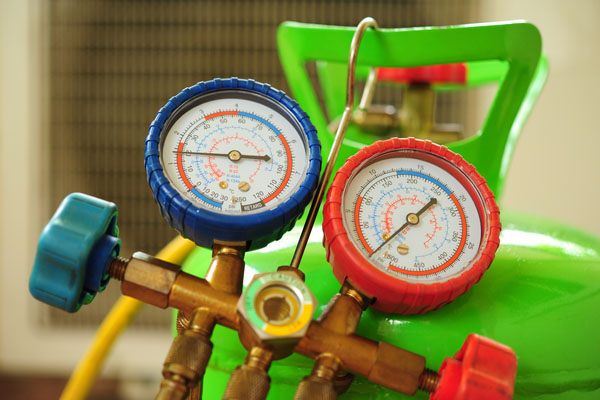
Find out what type of refrigerant is being used in the HVAC system. Some older properties have cooling systems that still rely on R-22. This was a popular refrigerant for quite some time. However, the EPA has banned this refrigerant’s use in heating and cooling equipment. Thus, it is getting increasingly difficult to find R-22, and this refrigerant is also incredibly costly to purchase. R-22 was banned completely in 2020. This has made it necessary to retrofit older units to use new refrigerants or to replace this equipment outright.
5. Compare Ongoing Energy Costs & the Cost of Replacing Existing Units
If you’re buying a home that will need to have its HVAC system replaced within short order, do you have enough in savings to take care of this? Purchasing a home that has old, outdated heating and cooling equipment could put you at risk for an emergency HVAC replacement.
Another important thing to think about is how much you’ll have to spend to operate the equipment that’s already in the home. Sellers should be able to show you their energy bills for the past two years. Energy bills that are abnormally high often mean that the HVAC system is at the end of its lifespan or that it hasn’t been properly maintained.
These tips will help you determine whether the HVAC system in a home should deter you from buying the property. Another thing that you can do is to schedule a local HVAC contractor to professionally assess the heating and cooling units during the purchasing process. To schedule an appointment, call McAllister Energy right now.
Additional Things to Think About
Here are a few additional items to inspect throughout the home in regards to the HVAC system.
Room by Room Temperature

As you move from one room to another, pay careful attention to temperature and humidity levels. Are there significant changes in different zones or rooms throughout the building? Among some of the more common reasons why homes have uneven temperatures are:
- leaky or blocked ducts
- improperly sized heating and cooling equipment
- blocked or damaged vents
- insufficient insulation
- outdated HVAC equipment
Airflow at the HVAC Vents
Take stock of inflow and outflow vent locations throughout the building. Are these vents getting consistent airflow? Are there changes in the air force from room to room or from vent to vent? Several issues that can impede airflow throughout a home include:
- air ducts that are blocked or dirty
- leaky ducts
- an overly restrictive HVAC air filter
- a clogged or dirty air filter
- vents that are too large or too small for their job
HVAC Zoning
Does the home have multiple heating and cooling zones? If it doesn’t, is the current HVAC equipment able to be zoned if you ever decide that this is a feature you want? This is information that your realtor can collect for you.
The Age of the HVAC Equipment
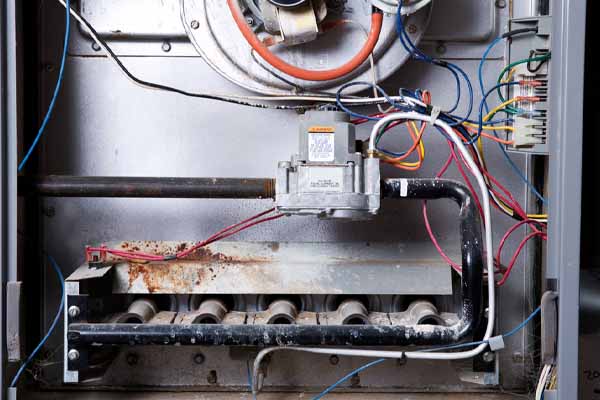
Learn the age of the currently installed heating and cooling units. Then, find out when each of these was installed. Take some time to look up each model and to learn more about how long they last. In some instances, you might think you have a pretty old HVAC system but it could have quite a few years of reliable service left. Most air conditioners last about 15 years and most furnaces last between 15 and 20 years.
The HVAC Maintenance History
Ask the seller to provide detailed information on the past maintenance and repair of the HVAC system. This will give you an idea of how to set your own maintenance schedule and of how well this equipment has been cared for in the past. Old HVAC systems that haven’t gotten regular maintenance throughout the years have a higher likelihood of breaking down and will usually need to be replaced much sooner than equipment that’s been diligently cared for.
HVAC Service Plans & Warranties
Find out whether there are active service plans or warranties for the HVAC system. Moreover, you should additionally determine whether or not these agreements can be transferred to you or used by you as long as they exist. This is important information to collect from sellers. You may be able to have the seller include a one-year warranty that covers all appliances including the HVAC system in case any of these break down.
Owner Manuals For The HVAC System

Be sure to request all manuals for the HVAC system. If there isn’t any physical manual to pass on, use the serial and model numbers on the heater and air conditioner to download digital copies. Owner manuals provide valuable insights when emergency issues arise.
Inspect the Physical Heating & Cooling Unit
Look for rust, dust, and strange sounds. Even small specks of rust and minor sounds can be signs of developing issues with the HVAC system. If you’re truly interested in buying a home, be sure to have a licensed HVAC company perform a comprehensive, professional inspection first.
Detectors & Thermostats
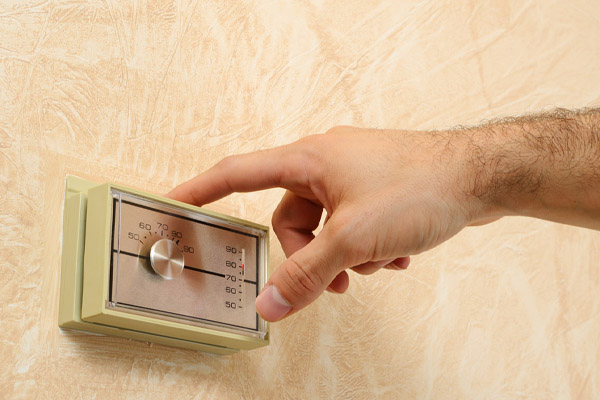
Carbon monoxide/smoke detectors and thermostats will be evaluated during the inspection, but it’s important to know their model numbers, capabilities, and age. Decide whether you want to replace these units or when their life expectancy dictates that they should be replaced.
Conclusion
At the end of the day, you have to determine whether or not the HVAC system is worth keeping or needs to be replaced. Do you have to have a new one installed? This is a significant purchase, so it’s definitely worth factoring into the home’s price or at least budgeting for in advance.
Call McAllister Energy For Superior HVAC Services
 Camden County, New Jersey locals can always turn to McAllister Energy for expert HVAC solutions. We are staffed by highly capable and certified technicians who are able to provide superior workmanship for all HVAC tune-ups, equipment replacements, repairs, and installation. They know how to get the job done right.
Camden County, New Jersey locals can always turn to McAllister Energy for expert HVAC solutions. We are staffed by highly capable and certified technicians who are able to provide superior workmanship for all HVAC tune-ups, equipment replacements, repairs, and installation. They know how to get the job done right.
We also guarantee the most competitive rates on our HVAC services. Our maintenance team can help you enjoy greater levels of comfort, improved overall energy efficiency, and far more manageable heating and cooling bills. When you need to have this important equipment replaced and want help finding the best model for your needs, we’ve got you covered there too. Everything that we do for our clients is backed by a solid guarantee. Set up your service appointment or schedule a pre-purchase inspection by calling McAllister Energy today. We’ll give you a detailed, in-home estimate for free!
You can click here to contact us now or call us at (856) 665-4545 to find out more!